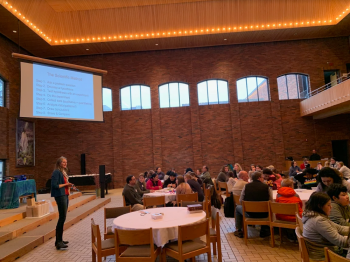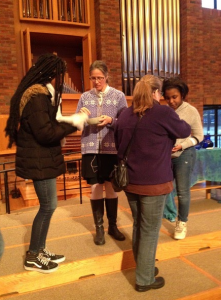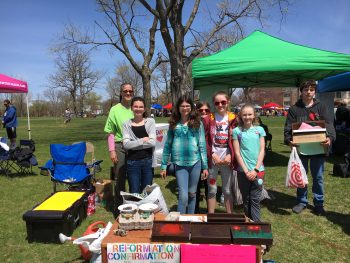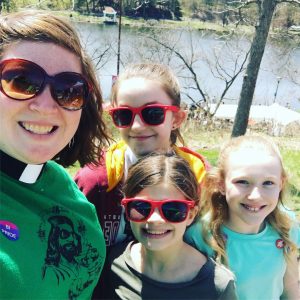Ministry Imagination Grants: Imagine. Innovate. Initiate.
By Nicholas Tangen

Heidi Ferris, Growing Green Hearts, spends some time with confirmands discussing God’s creation.
In 2017, ten congregations from across the Minneapolis Area Synod came together to collaborate on a new and exciting confirmation program. “Confirmation Reformation” brought young people from across the Twin Cities together to ask big questions and engage in hands-on learning. It was targeted to those congregations who had smaller confirmation programs.
“The vision was to be supportive of smaller congregations [that] just don’t have the numbers in their programming to make confirmation a thrilling experience for 6th to 9th graders,” said Pastor Emily Meyer, the creator and lead facilitator for Confirmation Reformation. “By pooling together, we had more resources so we could bring in guest speakers and presenters that no one of the congregations could afford to bring in on their own.”
The collection of congregations met once a month, often rotating locations so that young people had the opportunity to host their peers in their home church. This also gave students the chance to learn about different parts of the Twin Cities.
“It was sometimes really eye-opening for some of the kids,” said Melissa Weinhandl, the confirmation director at Peace Lutheran in Plymouth. “A kid that lives in South Minneapolis – their home, their school, their neighborhood, their daily activities – looks different than a kid who lives in Wayzata.”
Intentionally connecting kids from different parts of the Twin Cities was a strength of the program. And, as kids grew more comfortable engaging with youth from different congregations, friendships were formed and mentors were able to share gifts with a larger group of young people.
THE FIRST YEAR OF Confirmation Reformation brought the young people together to hear from speakers and pastors about the connections between faith and consumerism, faith and sexuality, and faith and community service. Seeing the success and the connections of the first year, Peace Lutheran in Plymouth applied for a Ministry Imagination Grant to support the creation of further curriculum elements and to pay for field trips, guest presenters, and to expand the program in 2018-2019.

Pastor Emily Meyer celebrates communion with a group of confirmands from several congregations.
“The Imagination Grant was our second year, and allowed us to expand into St. Paul,” said Meyer. “And I was able to spend more time developing actual written material for leaders and mentors, and to create more material to bridge the gap between our meetings.”
“The first year of Confirmation Reformation brought the young people together to hear from speakers and pastors about the connections between faith and consumerism, faith and sexuality, and faith and community service.”
The materials that Meyer was able to create helped leaders and mentors focus more intentionally on building relationships with the young people and facilitating learning. This shift in attention was beneficial not only for the students, but for the leaders as well.
“Emily and the others really helped us to craft the theme,” said Pastor Gretchen Rode, pastor at House of Hope in New Hope. “I was really able to step back and be a faith mentor for my confirmands which was really cool as a pastor”.
AS PASTORS AND LEADERS found freedom in the ability to connect and mentor their young people, Meyer focused on developing an age-appropriate curriculum that focused on spiritual practice and the intersection of faith and action. The program also sought out interesting contexts for the youth to engage these conversations, including the Mayday Parade, Augsburg University, and the Mall of America.

Pastor Emily Meyer and confirmatnds staff a table with information about Confirmation Reformation.
The field trip to the Mall of America was scheduled around the Christmas season and centered on a scavenger hunt that incorporated information about fast fashion and the ecological impact of fashion products; it examined the culture of consumerism amid the Mall’s busiest season. Within this context the youth were able to connect tangibly some of the larger concepts like grace, faith, and prayer to a very normal part of their lives and the lives of their family.
“In the second year we were looking at Luther’s catechism and thinking about how the different commandments and the different parts of the Lord’s Prayer fit into different justice issues,” said Pastor Rode. “So, when we were at the Mall of America, we were talking about the clothing industry, and body image, and thinking about what that means for honoring other people in our lives, or not stealing.”
“Yeah, the Mall of America trip was a favorite,” said Weinhandl. “The kids were super engaged with [the conversation] and being able to see and touch it was really impactful”.
“A kid that lives in South Minneapolis – their home, their school, their neighborhood, their daily activities – looks different than a kid who lives in Wayzata.”
This focus on practical faith was intentional on the part of Meyer and the other confirmation leaders, who recognized that middle school students are still very concrete learners. Providing youth with new and engaging contexts, and tangible examples, allowed for engagement with those large concepts like grace and faith.
“Let’s get out of our buildings,” said Meyer, “[We need to] look at our whole community and say, ‘What can we be doing around here that’s going to make God’s reign really obvious for all the people who live here?’ And that’s going to require kids and adults and elders to participate using the gifts that we’ve got, … which is what we’re talking about in affirmation of baptism”.
CONFLICTING SCHEDULES AND the shifting of congregational priorities brought Confirmation Reformation to an end following the 2018-2019 school year, though it continues in part through the leaders and youth who learned some new skills and ways of thinking together.

Pastor Gretchen Rode, House of Hope Lutheran in New Hope, and some of her confirmands explore God’s creation.
“That eye towards the bigger world has really stayed with our [confirmands],” said Pastor Rode. “And the partnership with the kids at Peace – there were some real friendships formed.”
“In the second year we were looking at Luther’s catechism and thinking about how the different commandments and the different parts of the Lord’s Prayer fit into different justice issues.”
“It was a learning event,” said Meyer, “I’m really glad we tried it, … possibly, because of COVID, especially knowing more about this [Zoom] technology, maybe we could do something like it online.”
While the future of the program is unknown, it is clear that the learning and the relationships built have had a lasting impact on the youth and the leaders. Confirmation Reformation provided a space and an experience where youth were able to engage with one another, to ask big questions in practical ways, and to see themselves as part of the work to create life-giving Christian community, and that is an example we all can follow.
